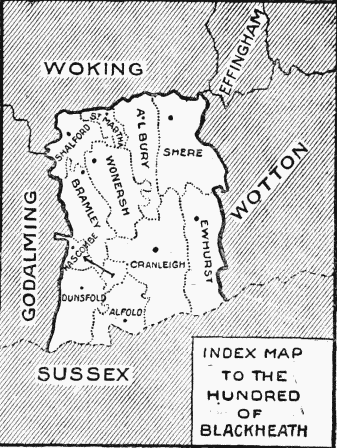A History of the County of Surrey: Volume 3. Originally published by Victoria County History, London, 1911.
This free content was digitised by double rekeying. All rights reserved.
'The hundred of Blackheath: Introduction and map', in A History of the County of Surrey: Volume 3, ed. H E Malden (London, 1911), British History Online https://prod.british-history.ac.uk/vch/surrey/vol3/pp70-71 [accessed 23 April 2025].
'The hundred of Blackheath: Introduction and map', in A History of the County of Surrey: Volume 3. Edited by H E Malden (London, 1911), British History Online, accessed April 23, 2025, https://prod.british-history.ac.uk/vch/surrey/vol3/pp70-71.
"The hundred of Blackheath: Introduction and map". A History of the County of Surrey: Volume 3. Ed. H E Malden (London, 1911), British History Online. Web. 23 April 2025. https://prod.british-history.ac.uk/vch/surrey/vol3/pp70-71.
THE HUNDRED OF BLACKHEATH
CONTAINING THE PARISHES OF
| ALBURY | DUNSFOLD | SHALFORD |
| ALFOLD | EWHURST | SHERE |
| BRAMLEY | HASCOMBE | WONERSH (fn. 1) |
| CRANLEIGH | ST. MARTHA'S of CHILWORTH | |
The hundred of Blackheath (Blackfelde, x cent.; Blacheatfeld, xi cent.; Blakehethfeld, xiii and xiv cent.) is bounded on the north by Woking, on the west by Godalming, on the east by Wotton, and on the south by the county of Sussex.
Tyting, in St. Martha's parish, was in Woking Hundred in 1086 and subsequently, (fn. 2) but is now counted as in Blackheath. In 1086 three virgates (rated) of Gomshall were in Wotton Hundred, not in Blackheath, but as Gomshall was ancient demesne, and the tenants were quit of all sheriffs' courts, it made little difference.
Blackheath is a high, heathy common, chiefly in the parishes of Albury and Wonersh; but much of the adjacent country, which is partly inclosed and partly open heath or planted with conifers, equally deserves the name. The population must always have been chiefly round about this country, and the place of meeting of the hundred court might have been expected to be upon it, as at Farnham; but in 1377 (fn. 3) it was held at La Perie, which is also referred to in the Godalming Rolls as the place of holding. This would seem to be near Perry Bridge in Shalford parish, over the Wey, on the road from Godalming to Bramley, on the extreme verge of the hundred.
The jurisdiction of the sheriff's court was practically much curtailed by private rights. In Domesday Odo of Bayeux held Bramley, which included a great deal of the then inhabited part of the hundred. This no doubt explains the low assessment at 6½ hides, against 97 under Edward the Confessor, and was perhaps the origin of the separate court leet of Bramley. The lords of Shalford, Wintershull, and Gomshall, and the rectors of Shalford and Cranleigh also had courts leet, and the lord of Albury view of frankpledge, but the latter gave the profits to the Crown. (fn. 4) The lord of Shere claimed view of frankpledge previous to 1238, (fn. 5) the lord of Albury claimed the same, and it was granted to Bramley by charter of Henry III. (fn. 6) But all these townships paid an annual fine to the sheriff. In 1671 Shere paid 20s., Gomshall 12s., Albury 13s. 8d., Shalford 6s. 8d. (fn. 7) The royal rights, such as they were, were granted by James I in 1620 to Sir Edward Zouche of Woking, and to the heirs male of Sir Alan his uncle, together with Woking Hundred and Manor and other lands, to be held by the service of bringing in the first dish to the king's table on St. James's Day and paying annually £100. All feudal incidents were expressly abrogated. (fn. 8)
Charles II granted this rent and the reversion of the hundred for 1,000 years to Viscount Grandison, Henry Howard, and Edward Villiers, in trust for the Duchess of Cleveland. (fn. 9) In 1708 James Zouche, younger son of Sir Edward, the last of the male heirs, died. The Duchess of Cleveland succeeded, but died on 9 October 1709. Her trustees in 1715 sold the rights in this hundred, as well as in Woking, to John Walter of Busbridge House, Godalming, whose son sold them to Lord Onslow in 1752, having obtained by Act of Parliament in 1748 a grant of the fee simple after the expiration of the 1,000 years. (fn. 10) The interest of the present Earl of Onslow in the hundred, if it continues, is purely nominal.
There was 'a Hundred Hedge' bounding Blackheath Hundred towards Godalming, referred to in rolls of Catteshull Manor at Loseley.

INDEX MAP TO THE HUNDRED OF BLACKHEATH